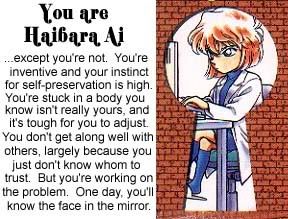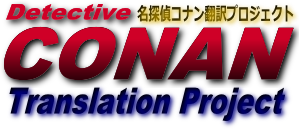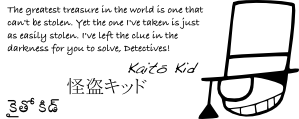Ask anything about Japanese language - 日本語ã
-
soratothamax
- Bang.....
Posts: 899- Contact:
Re: Ask anything about Japanese language - 日本語ã
Well, of course I know girls like Kahzuya use -kun toward guys. But when guys use it....well, I wanted to know what is meant by it. I always thought girls used it...and among the guys they just use name.
Then again, girls use -chan with one another...so it shouldn't be surprising that guys use it with one another....
Then again, girls use -chan with one another...so it shouldn't be surprising that guys use it with one another....
-
meidei
- ã
Posts: 185- Contact:
Re: Ask anything about Japanese language - 日本語ã
I believe Hattori actually uses -kun to tease KudÅKleene Onigiri wrote:Isn't Hattori saying "Kudo-kun"? Same with Genta and Mitsuhiko with "Conan-kun" D: Sometimes they all just say "Conan"/"Kudo" too (especially when they are worried or angry at him XD)soratothamax wrote: so if a guy used -kun toward another guy....what does that mean?
I don't see men using -kun with each other often...
I think Kazuha is saying "Kudo-kun" too, not sure about that tho.

- King InuYasha
Posts: 18
Re: Ask anything about Japanese language - 日本語ã
Where do you get twelve vowels for English? Even if you count the alternate sounds for each of the five letters representing vowels (a, e, i, o, u). That's only 11 sounds... I suppose if you count "y" it would be twelve, but I don't think it is usually considered a vowel when being classified...meidei wrote:79 direct syllables according to my calculations. C-j-V combinations are less common, but adding them in account we reach a total of 100 sounds plus the syllabic N. (Also note that two Japanese constants, "y" and "w" can give only ya-yu-yo and wa respectively. And "wa" has only few more decades of use max. I can already hear it shifting to a plain "a".)King InuYasha wrote:Thanks for that explanation...meidei wrote:Many reasons. In not-so-random order:King InuYasha wrote: Why does the Japanese language use Kanji? Why not consolidate to completely using either Hiragana or Katakana?
a) Japanese are attached to their script. (We all are. English has historical spelling -really messed up-, French has also -to a ridiculous point of using 4 letters to spell the sound /o/, Greek also - thanks god it got a bit simplified with the abolishment of the useless non-spoken accent marks) .
b) Many homophones. Japanese doesn't have a large variety of sounds. With just 5 vowels and 14~15 consonants that must come in pairs of C-V or C-j-V (this is, open syllables) you don't have many possible combinations. Kanji helps a lot here.
c) If kanji were to be abolished, all written material would became unaccessible to the future generations.
d)Since Japanese is written without any spacing, the mixture of all three scripts help to tell where the word start and where it ends. Getting rid of Kanji would require introducing new punctuation rules. And judging from romanized Japanese I have read, they are not really agreeing on a standard.
etc.
Oh, and sorry for any spelling or grammar errors, it's really late in my timezone and I'm not really in a position to proofread.
So, if Japanese had 14 consonants and 5 vowels, then that means there is a max of 70 C-V combinations?
Compared to English, which has 21 consonants (including y) and 5 vowels, meaning a max of 105 C-V combinations...
Hmm... It seems to make sense, but I dunno.
The spacing thing makes sense. Though, I thought there were standards for Japanese Romanization?
And I've noticed in the karaoke of the eighth Detective Conan opening, I hear "wa" but "ha" is written on screen... Why?
English has more than 5 vowels, about 12 AFAIK, many diphthongs and allows constant clusters, unlike Japanese. Some there are far more many possible sounds in English.
So can you use the "wa" kana to represent "wa" or must you always use "ha"?meidei wrote: There are standards for romanization (3 big ones) but not really for spacing.
For example, some consider particles like (wa, ga, ni, kara etc) as part of the word that modifies, others would spell it with a space between. Some spell auxilary verbs as one word, some in more than one. Eg Kikimashitayo OR Kikimashita yo OR kiki mashitayo OR kiki mashita yo. And that's a simple example. And then there is also capitalization which also has no hard rules. A lot of changes for a conservative nation like Japan.
That's one of the 3 irregularities of the modern Kana (syllabaries) spelling.And I've noticed in the karaoke of the eighth Detective Conan opening, I hear "wa" but "ha" is written on screen... Why?
The particle WA is spelled with the kana "ha" cause very long ago the symbol for H represented W.
The Particle E is spelled with the kana "he". I don't really know the reason for this. Either "h" at some point of the Japanese history was mute or they were actually pronouncing it "he" in older times.
The particle O is spelled with the kana "wo". All W-sounds except "wa" are long gone and words that used to be spelled with wi, we or wo are now spelled as i, e, o. The particle usage is an exception.
See more about Historic Kana Usage here.
-
meidei
- ã
Posts: 185- Contact:
Re: Ask anything about Japanese language - 日本語ã
I'm not really sure about the number, but in my (mainly British) English dictionary (IPA symbols appendix) they list 15 vowels and 11 diphthongs. Some are probably rare or dialectical variants but they are not just 5 vowels in English (the symbols used to spell the sounds are unrelated).Where do you get twelve vowels for English? Even if you count the alternate sounds for each of the five letters representing vowels (a, e, i, o, u). That's only 11 sounds... I suppose if you count "y" it would be twelve, but I don't think it is usually considered a vowel when being classified...
You spell wa with the kana "wa" everywhere except the use of "wa" as a grammatical particle ("the topic particle").So can you use the "wa" kana to represent "wa" or must you always use "ha"?
An example: Watashi wa Satou Miwako desu (I'm Miwako SatÅ
Last edited by meidei on April 6th, 2010, 3:04 pm, edited 1 time in total.

-
PokerFace312
- (ノ◕ヮ◕)ノ*:・゚✧
Posts: 1360
Re: Ask anything about Japanese language - 日本語ã
I was looking on the wikipedia page at the different hiragana, and ontop of the monographs that I notice sometimes in anime I noticed it was also talking about digraphs, diacritics, and digraphs with diacritics. I'm just wondering what those all are and how often they're used compared to the monographs. (http://en.wikipedia.org/wiki/Hiragana)
-
ranger
- Community Villain
Posts: 3588
Re: Ask anything about Japanese language - 日本語ã
In the current economic status is it worth learning? How vital is it to certain industries - and which industries?

-
meidei
- ã
Posts: 185- Contact:
Re: Ask anything about Japanese language - 日本語ã
There are two diacritics. Dakuten and Handakuten.ShinRanFTW wrote: I was looking on the wikipedia page at the different hiragana, and ontop of the monographs that I notice sometimes in anime I noticed it was also talking about digraphs, diacritics, and digraphs with diacritics. I'm just wondering what those all are and how often they're used compared to the monographs. (http://en.wikipedia.org/wiki/Hiragana)
Dakuten makes an unvoiced constant a voiced one.
For example the 5 letters for K sounds (ka ki ku ke ko) are ã

-
c-square
- Shounen Tantei Dan, Dai Seikou!
Posts: 1040
Re: Ask anything about Japanese language - 日本語ã
Whether Japanese is 'worth learning' all depends on what it would mean to you. Will it get you rich? Probably not. Japanese is mainly only spoken by Japanese and primarily only in Japan. That means, unless you plan on dealing directly with the core of a Japanese company or you are planning to work in Japan, Japanese probably won't help you much in the workplace. That being said, there are many other motivations for learning the language, including a desire to learn more about the Japanese culture, wanting to gain a fuller understanding of Japanese media (such as D.C.) or a hope of building international connections. So, whether it's 'worth learning' is really up to you and your goals.ranger wrote: In the current economic status is it worth learning? How vital is it to certain industries - and which industries?
 - Get your Detective Conan bobbleheads today! -
- Get your Detective Conan bobbleheads today! - 
- Callid
- Ratio vincit omnia.
Posts: 1433
Re: Ask anything about Japanese language - 日本語ã
While I do know the basics of Japanese writing (and pronunciation, although H/F and, of course, R, are still bothering me), I never understood who you should pronounce a "ry"- and a "hy"-sound. Are they only that difficult to pronounce because I'm doing it completely wrong, trying to speak them with English H or L (or German R)? Or are these indeed sounds that simply "are difficult", and aren't comfortable to speak, no matter who easy the Japanese R and H are to you?
If  ,
,  ,
,  ,
,  ,
,  ,
,  ,
,  or
or  are attached, that paragraph may not be 100% serious. Seriously.
are attached, that paragraph may not be 100% serious. Seriously.
This link provides further information.
Callid Conia Pact - Petitions - Archive
This link provides further information.
Callid Conia Pact - Petitions - Archive
-
c-square
- Shounen Tantei Dan, Dai Seikou!
Posts: 1040
Re: Ask anything about Japanese language - 日本語ã
Rya, ryu, ryo, hya, hyu and hyo shouldn't be that difficult to pronounce if you have the other sounds down.Callid wrote: While I do know the basics of Japanese writing (and pronunciation, although H/F and, of course, R, are still bothering me), I never understood who you should pronounce a "ry"- and a "hy"-sound. Are they only that difficult to pronounce because I'm doing it completely wrong, trying to speak them with English H or L (or German R)? Or are these indeed sounds that simply "are difficult", and aren't comfortable to speak, no matter who easy the Japanese R and H are to you?
Rya is just ri and ya said really quickly one after the other. Ri ya. Riya. Rya.
Same for the others:
Ryu = riyu
Ryo = riyo
Hya = hiya
Hyu = hiyu
Hyo = hiyo
 - Get your Detective Conan bobbleheads today! -
- Get your Detective Conan bobbleheads today! - 
- mangaluva
- Fangirl, Pokefreak, Grammar Roman, Movie Geek
Posts: 5246- Contact:
Re: Ask anything about Japanese language - 日本語ã
I found this written on a beach. I think it's Kanji but I can't read it. Can anybody here?






Nuzlocke 1: After Armageddon--COMPLETE
Nuzlocke 2: Blood and Bond--COMPLETE
Nuzlocke 3: Calamity Calls--COMPLETE
Nuzlocke 3.5: Isabelle's AlphaSapphire Story--ONGOING
Nuzlocke 4: Dimensional Destruction--ONGOING
Nuzlocke 4.5: Deliverance--ONGOING
Personal Tumblr---Fanfic Tumblr---Original Novel Tumblr---Other Novel Tumblr--DCMK blog
Nuzlocke 2: Blood and Bond--COMPLETE
Nuzlocke 3: Calamity Calls--COMPLETE
Nuzlocke 3.5: Isabelle's AlphaSapphire Story--ONGOING
Nuzlocke 4: Dimensional Destruction--ONGOING
Nuzlocke 4.5: Deliverance--ONGOING
Personal Tumblr---Fanfic Tumblr---Original Novel Tumblr---Other Novel Tumblr--DCMK blog
-
Abs.
- DCTP Staff Hero
Posts: 3270
Re: Ask anything about Japanese language - 日本語ã
"We were here"
Chinese.
Chinese.
Your opinion is always requested in Abs.' Random Polls of Whenever
- mangaluva
- Fangirl, Pokefreak, Grammar Roman, Movie Geek
Posts: 5246- Contact:
Re: Ask anything about Japanese language - 日本語ã
Is it? They look really similar. Thanks 
Nuzlocke 1: After Armageddon--COMPLETE
Nuzlocke 2: Blood and Bond--COMPLETE
Nuzlocke 3: Calamity Calls--COMPLETE
Nuzlocke 3.5: Isabelle's AlphaSapphire Story--ONGOING
Nuzlocke 4: Dimensional Destruction--ONGOING
Nuzlocke 4.5: Deliverance--ONGOING
Personal Tumblr---Fanfic Tumblr---Original Novel Tumblr---Other Novel Tumblr--DCMK blog
Nuzlocke 2: Blood and Bond--COMPLETE
Nuzlocke 3: Calamity Calls--COMPLETE
Nuzlocke 3.5: Isabelle's AlphaSapphire Story--ONGOING
Nuzlocke 4: Dimensional Destruction--ONGOING
Nuzlocke 4.5: Deliverance--ONGOING
Personal Tumblr---Fanfic Tumblr---Original Novel Tumblr---Other Novel Tumblr--DCMK blog
-
meidei
- ã
Posts: 185- Contact:
Re: Ask anything about Japanese language - 日本語ã
A quick way to tell if a text is Japanese is to see if Hiragana or Katakana are used. Chinese would be Kanji only. A complete japanese sentence needs at least one of the two Kana sets.
By the way, the only character I could understood is 我. Are the rest of the characters in their Chinese Simplified forms or I'm a æ¼¢å—èªã‚
By the way, the only character I could understood is 我. Are the rest of the characters in their Chinese Simplified forms or I'm a æ¼¢å—èªã‚

-
Abs.
- DCTP Staff Hero
Posts: 3270
Re: Ask anything about Japanese language - 日本語ã
[quote="meidei"]
By the way, the only character I could understood is 我. Are the rest of the characters in their Chinese Simplified forms or I'm a æ¼¢å—èªã‚
By the way, the only character I could understood is 我. Are the rest of the characters in their Chinese Simplified forms or I'm a æ¼¢å—èªã‚
Last edited by Abs. on April 13th, 2010, 7:47 am, edited 1 time in total.
Your opinion is always requested in Abs.' Random Polls of Whenever






